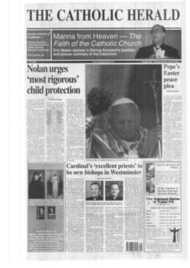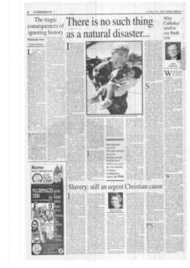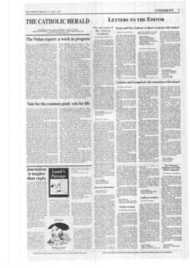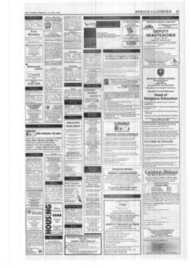Page 1, 20th April 2001
Page 1
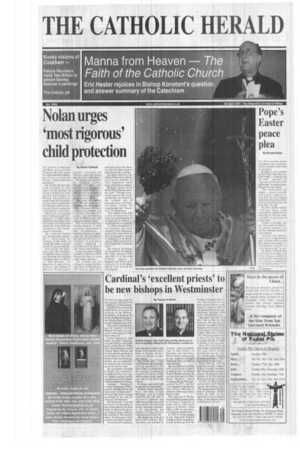
Report an error
Noticed an error on this page?If you've noticed an error in this article please click here to report it.
Tags
Share
Related articles
Nolan Bombarded With Suggestions
Bishops To Face Revolt Over Nolan Report
Nolan Moves Church Into Era Of Openness
Nolan Publishes 'draconian' Final Recommendations
Bishops Plan To Scrutinise Race Issues The Bishops Of...
Nolan urges 'most rigorous' child protection
By Simon Caldwell THE BISHOPS of England and Wales will next week scrutinise the first report of a high-powered committee set up to review the Church's child protection procedures.
The Nolan Review this week presented its first report to the bishops in advance of their low week meeting which begins on Monday, The preliminary report listed 50 recommendations which would make the Church's child protection procedures among the most rigorous in the land.
They even recommend that a bishop accused retrospectively of child abuse should be suspended since they claim no distinction should be made between retrospective and contemporary complaints.
The committee upheld the "paramountcy princi ple" which asserts the "welfare of the child" as always the primary consideration in any proceedings.
Lord Nolan, the chairman, said: Our proposals are meant to improve existing diocesan and national structures and procedures SC) that parishes are supported in their efforts to protect the children in their care. We also want to ensure a consistent and effective approach across the Church to child abuse."
The inquiry was initiated by Cardinal Cormac Murphy-O'Connor who was criticised for permitting paedophile Michael Hill to work as a chaplain at Gatwick Airport. Hill went On to re-offend.
This week, the cardinal said: "We are committed to ensuring that the Catholic Church becomes the safest of places for children, and 1 am sure that this hist report, and the ongoing work of the review, will help us to achieve this."
The recommendations include adoption of child protection representatives and co-ordinators; a national database on applicants for the priesthood; and pastoral provision for "victims". It also wants anyone cautioned or convicted not to be allowed any contact with children.
It says the Church should establish a National Child Protection Unit to liaise with outside agencies.
The bishops are not obliged to accept the findings, but it is believed most will want to apply them uniformly across the dioceses after the final report is published in the summer.
The report, however, was criticised because it did not mention the problem of false allegations which many priests have endured.
Margaret Jervis of the British False Memory Society said: "Though structurally rigorous, the recommendations are flawed by the careless use of language such as the blanket terms 'victim' for complainant and 'disclosure' for allegations.
"The welfare of the child is best protected by the truth, not a presumption of victimhood in relation to an allegation or suspicion.
"A robust recognition of the existence and harm caused by false allegations, particularly when believed and encouraged by people in authority, is as necessary in child protection as the recognition of genuine abuse."
The Church developed its procedures throughout the 1990s. Between 1995 and 1999, 21 of the 5,600 Catholic priests of England and Wales were convicted of child abuse and 63 were accused but not charged.
blog comments powered by Disqus


